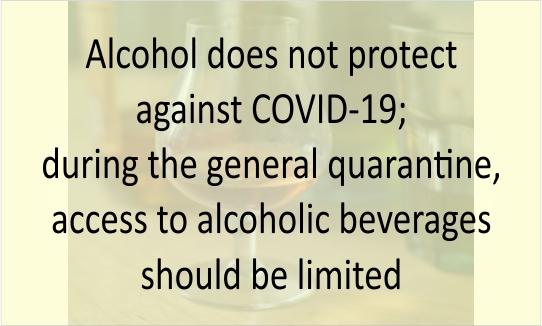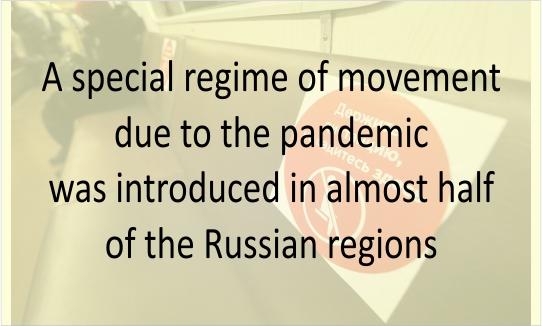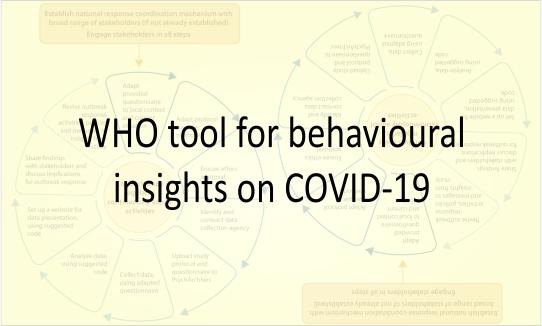Alcohol does not protect against COVID-19; during the general quarantine, access to alcoholic beverages should be limited

It is known that drinking alcohol in general is harmful to our health. We also know that alcohol use increases the risk of injury and violence, including intimate partner violence, and can lead to alcohol poisoning. During the general quarantine due to the COVID-19 pandemic, alcohol consumption can expose people's health even more, as well as increase the prevalence of risky behavior, mental health problems and violence. WHO / Europe reminds residents of the Region that alcohol consumption does not protect them from COVID-19, and recommends that national governments introduce measures to limit alcohol consumption.
Dispelling myths about alcohol and COVID-19
As part of the public health response to the COVID-19 pandemic, WHO collaborated with partners to develop the Essential Information on Alcohol and COVID-19 Fact Sheet, which provides information and guidance to dispel alcohol-related myths. at the time of the pandemic.
Fear and misinformation have led to the dangerous myth that drinking alcoholic beverages high in alcohol can kill the virus that causes COVID-19. This is not true. There are health risks associated with drinking all alcoholic beverages, but the use of ethyl alcohol (ethanol), especially diluted with methanol, can lead to serious health consequences, including death.
Alcohol use has been linked to the development of a wide range of infectious and noncommunicable diseases and mental health conditions that can increase people's vulnerability to COVID-19. In particular, alcohol negatively affects the body's immune system and increases the risk of adverse health effects. Therefore, people need to minimize alcohol consumption in all situations, and especially in the context of the COVID-19 pandemic.
Alcohol is a psychoactive substance that has been associated with the development of mental health problems; People who are at risk of or have an alcohol use disorder are more vulnerable, especially during self-isolation. Medical and treatment-and-prophylactic services must be vigilant about this problem and must be ready to provide assistance to all those in need.

Restricting access to alcoholic beverages during the COVID-19 pandemic
Alcohol causes three million deaths worldwide every year; one third of these deaths occur in the WHO European Region. The Region has not only the highest alcohol consumption in the world and the largest proportion of the population using alcohol, but also the highest prevalence of alcohol use disorders and the highest proportion of alcohol-related deaths in the overall population mortality.
“In the European Region, alcohol is consumed in excessive quantities and results in too many casualties. During the COVID-19 pandemic, we really need to wonder what we are risking by leaving people in home quarantine with access to a substance that is not only harmful their health, but also affects the way they behave towards others, including by causing violence, ”said Carina Ferreira-Borges, Alcohol and Illicit Drugs Program Manager, WHO / Europe.
Existing rules and regulations, including measures to limit the availability of alcoholic beverages to protect public health and reduce alcohol-related harm, should be maintained and further strengthened as necessary during the COVID-19 pandemic and other emergencies; however, any weakening of the existing regulations, as well as measures to ensure their implementation, should be avoided.
These actions should be complemented by activities to educate the public about the risks of alcohol use and to support and strengthen drug treatment services for the population.
By WHO Regional Office for Europe.
Read more
Trump on plan to get Americans back to work
Trump on the plan to get Americans back to work: "Careful, step by step" The specifics of the implementation of the plan will be taken into account from state to state: the regions least affected by the outbreak will be the first to return to normal. President Donald Trump on Thursday outlined the basic principles under which the US economy, severely affected by the coronavirus pandemic, can reopen, returning millions of jobs to the country. Trump unveiled the new plan Thursday night during a daily press briefing by the White House working group on coronavirus. The President noted that the plan will be implemented taking into account the specifics and situation in each individual state. At the same time, the states should take a step-by-step approach to returning Americans to their jobs - if a favorable epidemiological situation develops. Governors will be empowered to amend the implementation of the plan in their states, and will also have the right not to resume…
Where was the special travel regime introduced due to the pandemic?
A special regime of movement due to the pandemic was introduced in almost half of the Russian regions Authorities of 39 from 85 regions of Russia by Friday evening introduced a special mode of movement due to the spread of a new coronavirus infection. Some of them limited entry to certain settlements, some revised the conditions of movement throughout the territory of the entire subject, follows from the statements of the regional authorities and the regulatory legal acts signed by them. The self-isolation regime, mandatory or advisory, has been introduced in all regions of the Russian Federation. In most subjects, it applies to citizens of all ages, in some - only to certain groups, for example, persons over 65 years old. Cases of coronavirus infection…
WHO tool for behavioural insights on COVID-19
WHO tool for behavioural insights on COVID-19 A WHO tool for rapid, flexible and cost-effective monitoring of public knowledge, risk perceptions, behaviours and trust is now available to countries in the WHO European Region to make their COVID-19-related response relevant and actionable. The outbreak is placing an overwhelming burden on health systems and authorities to respond with effective and appropriate interventions, policies and messages. One of the most critical elements of reducing virus transmission is public behaviour. For crisis…


